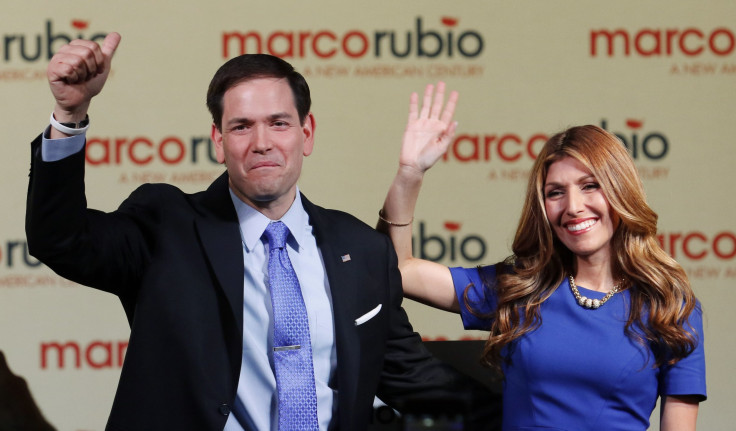
Marco Rubio’s views on a constitutional amendment on marriage are unclear, but the Presidential-hopeful Florida Senator clarified some of his views this week. Specifically, Rubio would attend a gay wedding. Jorge Ramos pulled that answer out of him yesterday during an interview on Fusion. Ramos is known for asking hypothetical questions that test a subject’s empathy. Last month he asked a man who pulled down a girl’s skirt what he’d think if someone did the same to his mother. By similar logic, Ramos seemed to test Rubio’s compassion as he puts himself forward as a Presidential candidate.
“You believe that marriage is between a man and a woman,” Jorge Ramos said to Marco Rubio on Fusion yesterday.
“Yes,” Rubio affirmed.
“If someone in your family or your office that happens to be gay and they invite you to their wedding, would you go?” Ramos asked Rubio.
“If it’s somebody in my life that I care for, of course I would,” Rubio said. “I’m not going to hurt them simply because I disagree with a choice they’ve made or because I disagree with a decision they’ve made, or whatever it may be. [....] Ultimately, if someone that you care for and is part of your family has decided to move in one direction or another or feels that way because of who they love, you respect that because you love them.”
Rubio, who is Catholic, justified the decision with an analogy between same-sex marriages and divorced Catholics. “If someone gets divorced, I’m not going to stop loving them,” he said. Rubio might “love” gay couples, but he’s not exactly fighting for their rights under the law. It’s all part of his balancing act to support gay marriage bans in conservative states, while not looking like a bigot.
“There is a growing intolerance on this issue, intolerance of those who continue to support traditional marriage,” Rubio told a crowd at Catholic University of America in Washington in 2014. “Even before this speech is over, I’ll be attacked as a hater or bigot. Or someone who’s anti-gay. This intolerance in the name of tolerance is hypocrisy. Supporting the definition of marriage as one man and one woman, is not anti-gay. It is pro-traditional marriage.”
Yet being pro-traditional marriage has put Rubio in direct conflict with gay-rights advocates. It led him to support the Defense Of Marriage Act (DOMA) in 2001, which effectively barred gay couples from receiving equal federal benefits.
“I want to thank [the] Republican leadership for taking action to defend this critical law that was enacted by a bipartisan majority in Congress and signed by President Bill Clinton. It is unfortunate that President Obama decided to no longer defend the Defense of Marriage Act. [...] This law protects one of our most sacred institutions and because of the House’s actions today, it will be defended,” Rubio said in a statement in 2001.
No anti-gay bill will be passed again unless it’s a constitutional amendment. After DOMA was struck down in 2013, Legislators like Rubio have had an easier time advocating for a “states rights” approach to protecting conservative marriage goals. Now the debate is turning to potential pro-gay bills, as well as future Supreme Court decisions that could strike down anti-gay laws. It’s only in this new context that Rubio is against all federal marriage laws. However, he does see limits in legal discrimination against gay couples. Earlier this week, he told NPR’s Steve Inskeep that he believes in religious freedom laws being passed in states like Indiana, as long as they are narrow in scope.
“I'll tell you where I stand. I don't believe you can discriminate against people. So I don't believe it's right for a florist to say, I'm not going to provide you flowers because you're gay. I think there's a difference between not providing services to a person because of their identity, who they are or who they love, and saying, I'm not going to participate in an event, a same-sex wedding, because that violates my religious beliefs.
“There's a distinction between those two things. So, certainly, you can't not — it's immoral and wrong to say, I'm not going to allow someone who's gay or lesbian to use my restaurant, stay in my hotel, or provide photography service to them because they're gay. [...] What I'm talking [...] is someone who's saying, 'I just don't want to participate as a vendor for an event, a specific event that violates the tenets of my faith.'"
© 2025 Latin Times. All rights reserved. Do not reproduce without permission.




